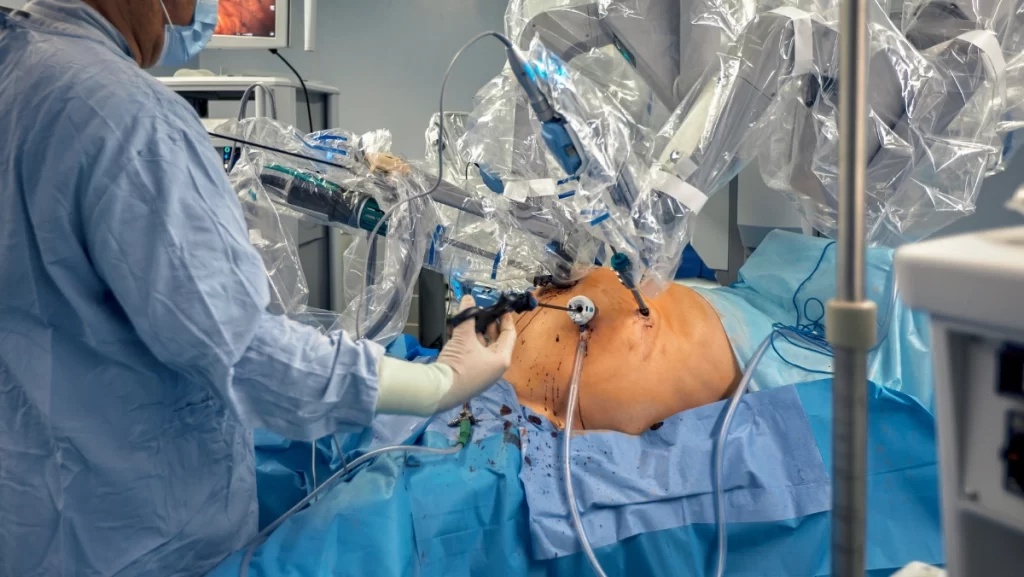Overview
Laparoscopic gynecological surgery uses small incisions and a camera to allow doctors to look inside your pelvis and treat various conditions. Instead of large cuts, surgeons use tiny instruments and a thin, lighted tube known as a laparoscope. This method significantly reduces recovery time and post-surgery discomfort.
Laparoscopy in obstetrics and gynecology has changed the way doctors treat many common conditions. This surgical method has made it easier for both doctors and patients to manage issues like ovarian cysts, high risk pregnancies, and fibroids without the need for open surgery.
Key Benefits:
- Smaller scars
- Reduced hospital stay
- Faster recovery
- Lower infection risks
Patients seeking laparoscopic gynecological surgery in Chennai have access to some of the best facilities and doctors, offering advanced and safe care.
Types of Laparoscopy in Obstetrics and Gynecology
Laparoscopy in obstetrics and gynecology has advanced, offering minimally invasive options for diagnosing and treating various conditions. This surgical approach involves small incisions, through which a laparoscope—a thin tube with a camera—is inserted for precision treatment. Here are common types of laparoscopic gynecological surgery:
- Diagnostic Laparoscopy: Used to identify the causes of infertility, pelvic pain, or endometriosis.
- Laparoscopic Hysterectomy: Removes the uterus in cases of severe fibroids, endometriosis, or cancer.
- Laparoscopic Myomectomy: Removes fibroids while preserving the uterus, often ideal for women planning pregnancy.
- Endometriosis Excision: Treats endometriosis by removing tissue outside the uterus, reducing pain and improving fertility.
- Ovarian Cyst Removal: Removes cysts that cause pain or complications, preserving ovarian function when possible.
Laparoscopy in obstetrics and gynecology provides effective treatment options with faster recovery and minimal scarring, supporting women’s reproductive health and well-being.
Symptoms That May Lead to Laparoscopic Gynecological Surgery
Certain symptoms might indicate the need for laparoscopic gynecological surgery. It’s important to consult with a gynecologist if you’re experiencing any of the following issues:
Common Symptoms
- Chronic pelvic pain
- Heavy or irregular periods
- Pain during intercourse
- Severe cramps
- Infertility issues
If these symptoms are affecting your daily life, your doctor may suggest a laparoscopic gynecological surgery to diagnose and treat the underlying condition. For those in Chennai, specialized clinics for laparoscopic gynecological surgery in Chennai offer expert care for these issues.
Treatment Options: Spotlight on Deepa Hospital
When considering laparoscopic gynecological surgery, Deepa Hospital in Chennai stands out as one of the top choices for women seeking advanced and compassionate care. The hospital offers a range of laparoscopic procedures in gynecology, tailored to meet each patient’s individual needs.
Why Choose Deepa Hospital?
- Experienced Surgeons: The hospital’s gynecological team is highly skilled in performing both basic and complex laparoscopic gynecological surgeries.
- Cutting-Edge Technology: Deepa Hospital is equipped with the latest medical technologies to ensure precision and safety during surgery.
- Comprehensive Care: From initial diagnosis to post-surgery recovery, Deepa Hospital provides end-to-end care.
Patients who need laparoscopic gynecological surgery in Chennai can trust Deepa Hospital for world-class treatment and care in a comfortable environment.
Recovery After Laparoscopic Gynecological Surgery
Recovery after laparoscopic gynecological surgery is generally faster than traditional open surgery, thanks to the minimally invasive nature of the procedure. Post-operative care includes a few key steps for optimal recovery:
- Rest and Hydration: Resting well and staying hydrated support healing.
- Pain Management: Mild pain is common; over-the-counter medications are often enough for relief.
- Avoiding Heavy Lifting: For a few weeks, it’s recommended to avoid lifting heavy objects to prevent strain.
- Follow-up Appointments: Regular check-ups are essential to monitor healing and ensure no complications.
- Gradual Return to Activities: Resuming physical activities gradually is advised to promote overall recovery.
Laparoscopic gynecological surgery typically allows patients to return to daily routines faster, with the added benefits of less scarring and lower risk of infection. Comprehensive care following laparoscopy in obstetrics and gynecology ensures effective healing and lasting results.
Prevention: How to Minimize Future Gynecological Issues
While laparoscopic gynecological surgery is an effective treatment for many conditions, there are steps you can take to prevent future problems.
Tips for Prevention:
- Regular Gynecological Checkups: Early detection is key to managing issues before they worsen.
- Healthy Diet and Exercise: Maintaining a healthy lifestyle can reduce the risk of developing conditions like fibroids or endometriosis.
- Listen to Your Body: Don’t ignore symptoms like abnormal bleeding or pelvic pain.
By taking proactive steps, you can minimize the chances of needing future laparoscopic procedures in gynecology.


